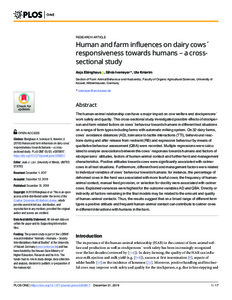Human and farm influences on dairy cows' responsiveness towards humans - a cross-sectional study
| dc.date.accessioned | 2019-02-05T13:19:51Z | |
| dc.date.available | 2019-02-05T13:19:51Z | |
| dc.date.issued | 2018-12-31 | |
| dc.identifier | doi:10.17170/kobra-20190204152 | |
| dc.identifier.uri | http://hdl.handle.net/123456789/11067 | |
| dc.description.sponsorship | Gefördert durch den Publikationsfonds der Universität Kassel | |
| dc.language.iso | eng | |
| dc.rights | Urheberrechtlich geschützt | |
| dc.rights.uri | https://rightsstatements.org/page/InC/1.0/ | |
| dc.subject.ddc | 630 | |
| dc.title | Human and farm influences on dairy cows' responsiveness towards humans - a cross-sectional study | eng |
| dc.type | Aufsatz | |
| dcterms.abstract | The human-animal relationship can have a major impact on cow welfare and stockpersons´ work safety and quality. This cross-sectional study investigated possible effects of stockperson and farm related factors on cows´ behaviour towards humans in different test situations on a range of farm types including farms with automatic milking system. On 32 dairy farms, cows´ avoidance distances (AD), tolerance to tactile interactions (TTI), behavioural reactions during and after release from restraint (RB) and expressive behaviour by means of qualitative behaviour assessment (QBA) were recorded. Multiple regressions were calculated to analyse associations between the cows´ responses towards humans and factors of stockpersons´ attitudes, factors of human-animal contact and further herd and management characteristics. Positive attitudes towards cows were significantly associated with calmer cows in all test situations. Furthermore, different herd and management factors were related to individual variables of cows´ behaviour towards humans: for instance, the percentage of dehorned cows in the herd was associated with more fearful cows; the frequency of human-animal contact, manual feed provision, or selection for docility were associated with calmer cows. Explained variances were highest for the outcome variables AD and QBA. Directly or indirectly all factors remaining in the final models may be related to the amount and quality of human-animal contacts. Thus, the results suggest that on a broad range of different farm types a positive attitude and frequent human-animal contact can contribute to calmer cows in different interactions with humans in the barn. | eng |
| dcterms.accessRights | open access | |
| dcterms.creator | Ebinghaus, Asja | |
| dcterms.creator | Ivemeyer, Silvia | |
| dcterms.creator | Knierim, Ute | |
| dc.relation.doi | doi:10.1371/journal.pone.0209817 | |
| dc.type.version | publishedVersion | |
| dcterms.source.identifier | ISSN 1932-6203 | |
| dcterms.source.issue | 12 | |
| dcterms.source.journal | PLoS ONE | |
| dcterms.source.pageinfo | e0209817 | |
| dcterms.source.volume | 2018, 13 |
Files in this item
This item appears in the following Collection(s)
-
Artikel [1103]

